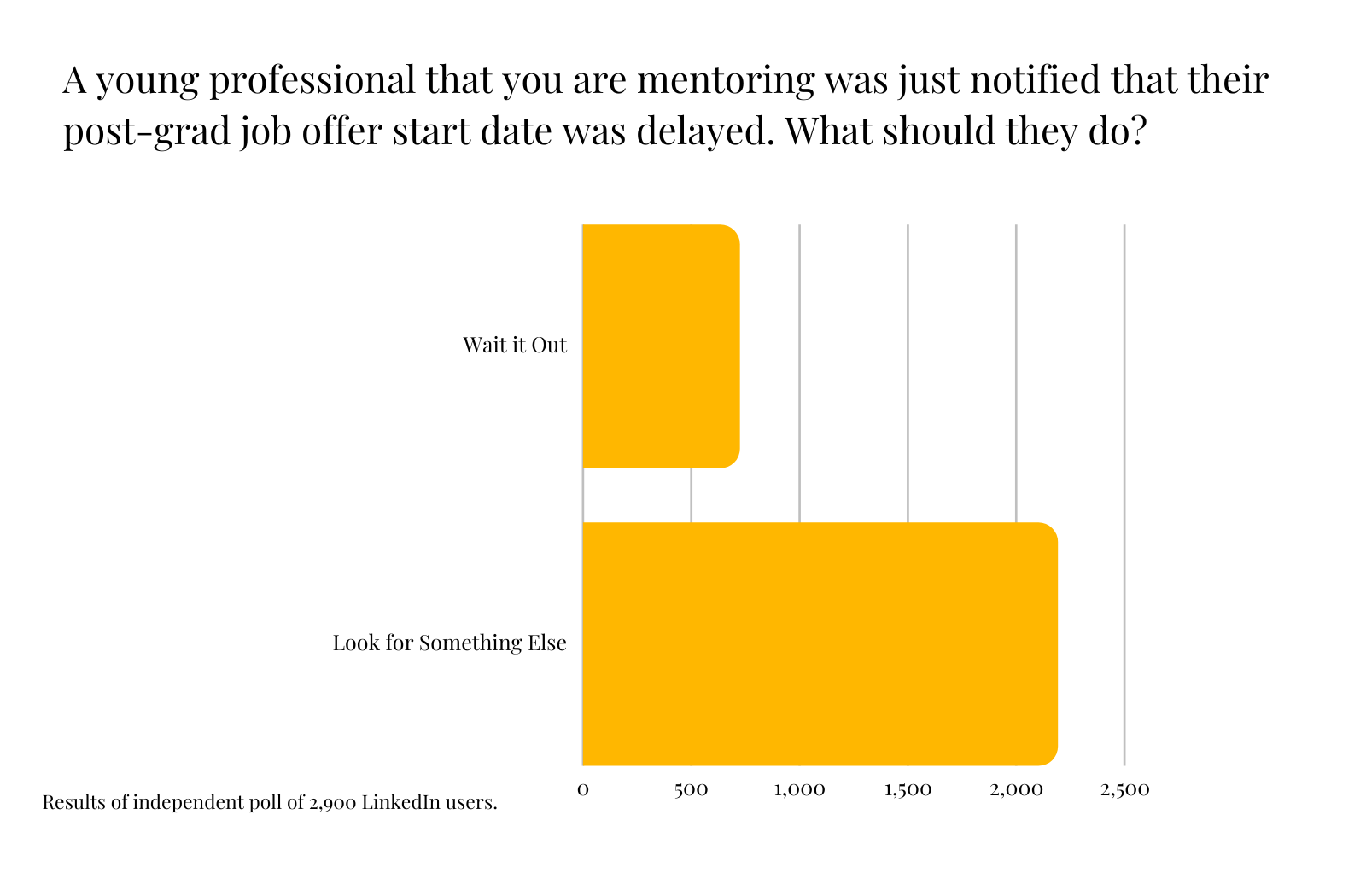
Delayed Job Start: When To Wait And When To Move On?
You’ve probably heard of layoff anxiety, but have you heard of hiring anxiety? This is what some new MBA hires at McKinsey and Bain are doubtless experiencing. According to the Wall Street Journal, they have just heard from their employers that some of their start dates (many of which have not been solidified) will be delayed until 2024. To lessen the pain, Bain is offering to pay new hires $40,000 to work for a nonprofit or $30,000 to learn a new language or participate in an educational program if the new hires delay their start date until April 2024.
It’s a stomach-churning moment for these young professionals who, unlike many older workers, never experienced job start delays (or even outright job rescinds) during the Great Recession of 2008. One thing, however, is clear: they face a difficult decision with several pros and cons.
Emory University marketing professor David Schweidel sympathizes. “On the one hand, students may appreciate having a little bit more flexibility after finishing up what can be an intense 1- or 2-year program. … But, given the current state of the economy, this is certainly going to create some anxiety… Right now, offers aren’t being withdrawn. But anyone that travels frequently is familiar with the 20-minute flight delay that ultimately becomes several hours or ends up being canceled. There are also students who will be eager to get to work because of financial obligations.”

Briefcase Coach’s Sarah Johnston asked her followers on LinkedIn how they would counsel these recent hires. While the majority of those who answered felt these recent hires should move on to a different job, unsurprisingly, she received a wide range of opinions. Let’s start with the disadvantages first.
Cons: The Cost of Waiting for a Delayed Start Date
The drawbacks to new hires waiting for a delayed start date include the following:
1) They lose valuable time to launch their career.
2) There is no certainty as to whether the employer will delay the start date yet again, or even rescind the offer.
3) The job market may worsen during the time they are waiting.
Given these possibilities, it’s not surprising that many Briefcase Coach respondents exhorted soon-to-be graduates to prioritize their own interests.
Put Yourself First
The firms’ reported actions are “a great reminder to always, always, take care of yourself and your career,” said job search and career expert Hannah Morgan. “Be skeptical of company promises,” she advises. “Keep looking until you have another offer and weigh the pros and cons.”
Career coach Shelley Piedmont concurs. “Organizations will do what best makes sense for them, not what makes sense for you. Look out for #1…yourself. Keep looking. If it doesn’t suit McKinsey or Bain to fulfill their promise, they won’t and will think nothing of it. Remember all the people that had offers in tech organizations only to have them pulled, sometimes after people relocated.”
Beverly Smith, career search strategist, advises the new hires to look elsewhere, but also to see the positive side of the experience. “They are better for having gone through the interview process. They can use the experience to learn and grow. This obviously wasn’t the right opportunity at this time and [they should know] there is something better out there for them!”
The Importance of Context When Considering a Delayed Start Date
After receiving a delayed start date, new hires should also look for any information that sheds light on the state of their soon-to-be employer. For example, the same Wall Street Journal article reports that McKinsey is in the process of laying off as many as 2,000 workers. This news might just sway these new hires to keep looking for employment, perhaps even in a non-consulting industry.
Legal recruiter Wendy Schoen, MBA, JD, pointed out that any company in the midst of active layoffs “will have a harder time having their promises of delayed employment believed” by their recent hires. “It would be natural to question the validity of these promises of eventual, if delayed, employment,” she adds.
Pros: The Case For Waiting It Out
For those who can afford to wait it out, however, there are several compelling reasons to do so:
1) Fulfilling a lifelong dream. The new hires might have dreamed for years of working for a prestigious firm such as Bain or McKinsey. If this is a long-held goal, it just might be worth it to them to wait for a delayed start date.
2) Getting real-life experience. They can use the waiting time to get valuable real-life experience. Perhaps this is the time to take advantage of the $40K offer to work for a nonprofit that serves a cause or community close to your heart or to take that 30K offer to learn Farsi or German.
3) Assuming the best about your employer. If you assume good intentions on the part of your employer, this will make it more likely that you will understand the reasoning behind their decision. Senior Executive and advisor Goetz Friedrich Kuras explains, “I think that both McKinsey and Bain are sincere in their promise. They are investing to ensure that skill and experience are growing until these young associates can be onboarded…..Also, McKinsey and Bain-level talent is very scarce and there was a significant cost in finding it. One would think twice about writing it off.”
Senior financial healthcare executive John Tytko also strongly advocates waiting it out. “A couple of months will not make a noticeable difference to your career growth,” he says. Tytko experienced something similar in 2008 when he entered the professional world. “PwC notified all new hires/MBAs that they would push back our start dates and reduce the starting base salary…” He chose to wait it out and, he added, “I am still here.”
For Google Strategic Engagement Manager Adrian Verga, the prestige of the company is another important factor to consider. “For McKinsey and Bain, I would recommend they wait it out. Experience at any top management consulting firm will set up any individual for success in the future. Success not only through the name itself but the types of case work they will get to operate on.”
If they do opt to wait it out, they should make sure to make productive use of their time and recognize that the ability to wait it out is a privilege, as often only those with financial resources have the luxury of waiting.
The Importance Of One’s Financial Situation
This leads to the final point, which is that one’s decision will largely depend on one’s financial situation. Matt Gaboda, a Utility Operations Supervisor, describes this as a “white collar layaway.” Says talent acquisition leader Rebecca Oppenheim, “I am a Great Recession graduate…and hustled on the side as a waitress in NYC for years. I can tell you one thing – the graduates who can “put off” starting their full-time job, or potentially accept an incentive less than their promised salary, are not going to be a diverse bunch….People who can afford to live on less money are typically able to get financial support elsewhere to make ends meet.”
Senior marketing leader Veronica Jubera has a similar story. “Looking back, I had to start working summer post-MBA, [because[ I had loans to pay and I needed to pay rent. Those options of paying you 30k are all good and great, but if you’re supposed to pay health insurance for almost a year, and cover student loans…you can’t live on 30k in most places. The issue is that this again plays into the privilege that is over-represented in MBAs. Your starting class of April 2024 will be looking very different than it would have otherwise looked.”
Follow Your Gut – And Your Values
Executive coach Michelle Rademacher advises these young professionals to check in with their gut – and their values. She suggests they ask themselves a series of questions:
- Have their perceptions of the company been altered by the delayed start date?
- Are they still excited about the company?
- Have their values been violated in any way?
“If they are still excited and no values have been violated, wait,” she advises. “Spend the time in the waiting doing something to enrich their professional life that they wouldn’t have been able to do otherwise with this blessing of time.”
“If they are no longer excited and their values have been violated, move on,” she says. “Recognize the value of the lesson: that at each step of the hiring process where new information is provided, evaluate based on facts that are then assessed against their values.”
Ultimately, there is no right or wrong answer to whether they should wait or move on. The decision these new hires have to make is personal and should take into account factors such as finances, career goals, and their own personality. Whatever they choose to do, they should see this development, although frustrating, as a growth experience. Unsettling as it may be, it will help teach them about their goals and what is negotiable for them in the long run – and what isn’t.


